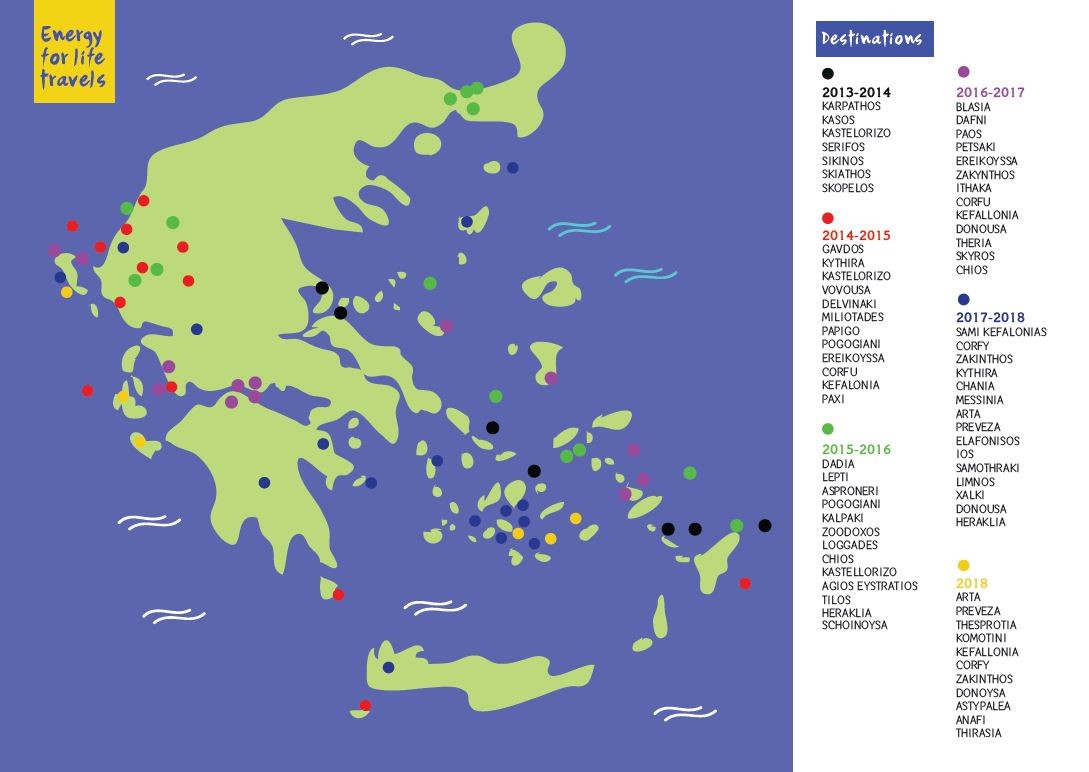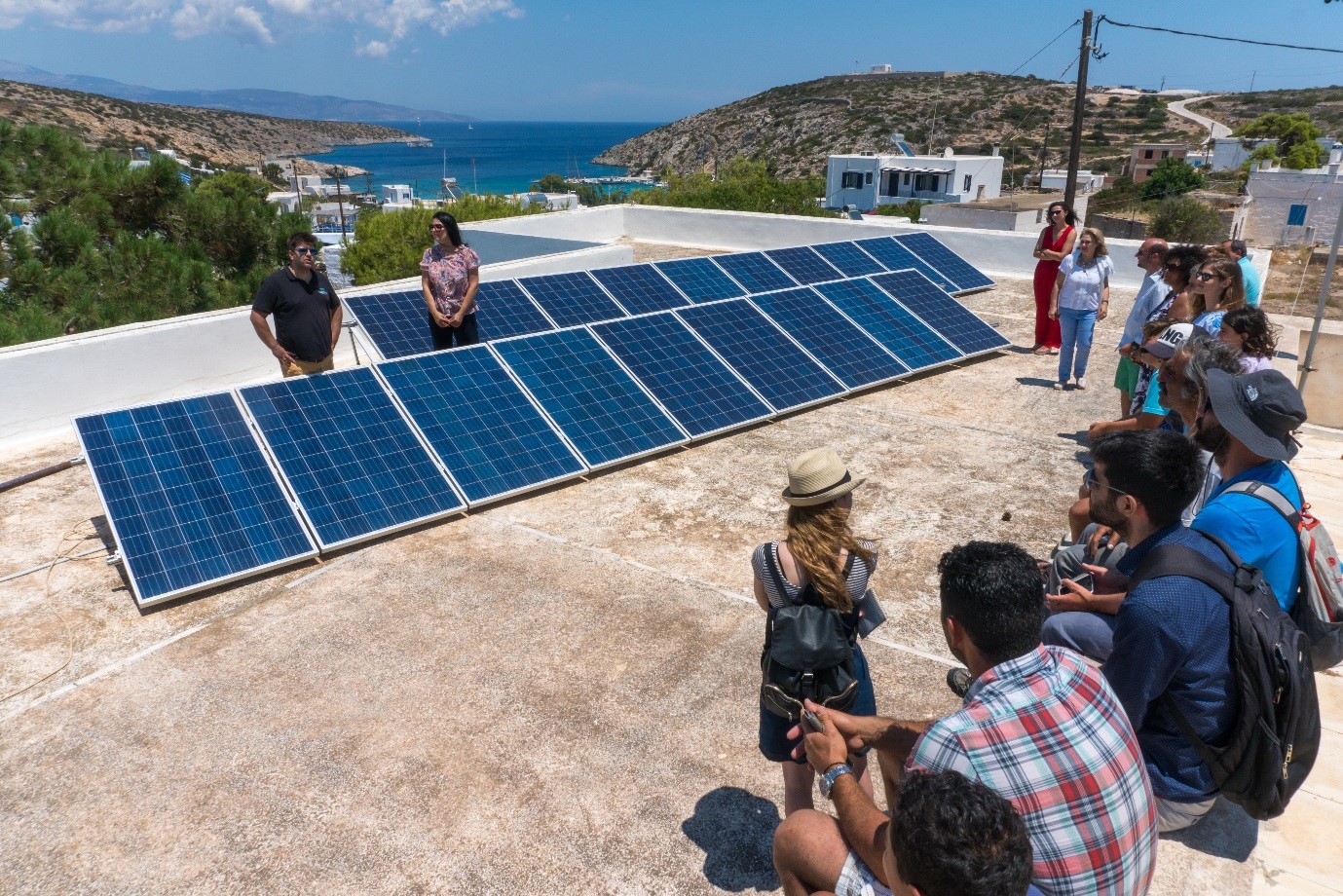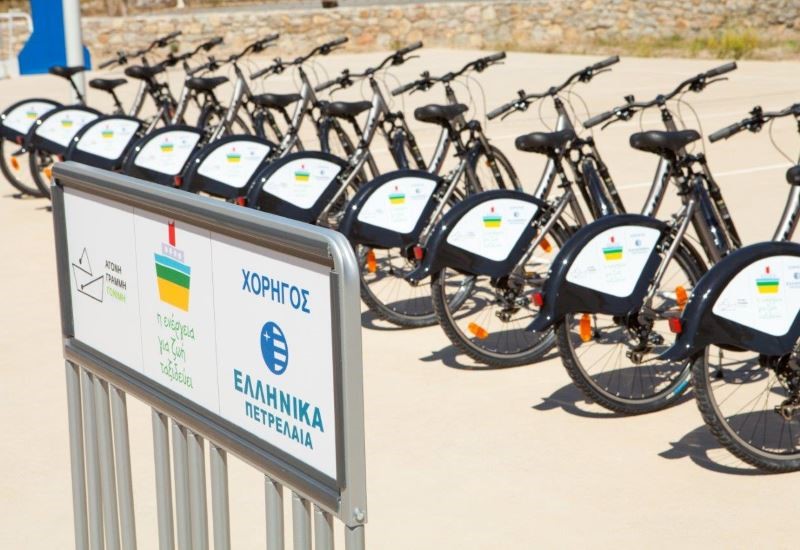Energy For Life Travels
Description
“Energy for Life Travels” is an environmental awareness program active since 2013. Calls on remote destinations in Greece, throughout the school year, by raising ecological awareness for students of Primary, Middle and High Schools, as well as indirectly for local communities. The program aims to preserve and conserve our environmental heritage and cultural legacy, to empower sustainable decisions and contribute to sustainable development, to raise awareness on climate change, to promote innovation and collaboration, and to educate on energy management. Executed under the auspices of the Ministry of Education, supported by the European Parliament and the UNRIC for Western Europe.
Inside and outside of the classroom, the children will embark on a journey, alongside the representatives of environmental entities, of raising awareness and obtaining knowledge, on how to preserve the environment, sustainable development and the energy and natural resource management methods. We have adopted the SDGs, as a framework. We support access to equal and quality education with no discrimination over gender, religion, race, by helping students acquire skills towards sustainable development and a sustainable way of life. E.g., we reach out to areas in northeastern Greece where multicultural groups reside, and we offer girls and boys a fair chance to partake, promoting an egalitarian and participatory social model. We support access to sustainable, easily accessible and modern energy sources through infrastructure (e.g. photovoltaic systems). Through raising awareness, and thus involving a great number of people, we contribute to the general effort made to reduce the negative environmental impact of the local communities (e.g. bicycles donation). We also focus on waste management. E.g. students collect natural ingredients (olive leaves, small branches etc.) and organic kitchen waste and learn how to compost. Hence, they understand the importance of said procedure in protecting the environment, the significance of recycling organic matter, the usefulness of managing big quantities of natural waste and how it acts as a soil enhancer that augments its fertility. We raise awareness and educate people on topics such as climate change and managing the greenhouse effect. E.g. Noesis science center, has created an “energy game” and children, through trial and error, learn that one’s “energy” choices is everyone’s business, and no matter how important or not they may seem, the really do affect all of us as a whole. We also focus on marine pollution and how to protect the marine ecosystems as a high value environmental and cultural element of our country. The Greek seas are home to numerous marine mammals and fish, some of which are protected species, such as the monk seal Monachus Monachus, the sea turtle Caretta-Caretta, the bottlenose dolphin etc. Moreover, as a unique cultural element, the sea unites the lives of the country’s residents from West to East, but it also unites Greece with its neighboring countries and the three continents (Europe, Asia and Africa). Hence, it is essential for young students to identify the sea as a life-giving element, to be informed about the risks faced by the marine species and about ways sustainable development of resources can be achieved. We cooperate with experienced entities that have been our trusted partners since the very beginning, as well as new ones every year, and we respect any existing sustainable development policies. The program’s realization is based on synergies with several ΝGOs, Universities, Associations, Professors etc. who take an active interest on environmental matters.
Below you can find all the consecutive steps for the completion of the program:1st step: Selection of theme & areas. At the beginning of each school year, we select the theme of the workshops and the areas the project will take place in. The main factor is accessibility, since we choose remote areas that would not otherwise have access to similar ventures. We also consider specific requests we have received expressing an interest to participate in our program. 2nd step: Authorization. The project needs to be granted Official Approval from the Hellenic Ministry of Education, Research and Religious Affairs, since it takes place inside school premises. Hence, we go through all the procedures needed for the task to be approved. 3rd step: Selection of entities. At the initiation stage of the project, we determine which of the entities that we have worked with in the past should be part of the project this year and we research to find new collaborations. We work on the content of the workshops to be relevant to the syllabus of the school grades to which it will be delivered. That is done in order to assure a continuation between what the children will be taught in the school framework and take it up a notch through the experiential workshops. The point is to not only offer extra knowledge but also enrich what already exists. 4th step: Contact with local schools. We proceed to contact local schools and entities in order to schedule workshops (presentations, experiments, quizzes, games etc.) that take place on set dates. This effort involves coordinating the school schedule and the entities’ availability. 5th step: The workshops take place. We organize the trip and provide accommodations for the parties involved. It should be noted that, during this stage, numerous of projects are being implemented simultaneously each year. 6th step: Collect overviews of the workshops. Upon completion of the workshops, we consult both parties, regarding their experience. Each entity is required to submit photos and a written briefing of the workshop that was conducted. 7th step: Collect feedback from the participant schools. At the closing stage of the each project, we receive constructive feedback from the schools concerning the impact of their experience. All pertinent information and comments can be found on the public website that was created specifically for the program.
In addition to extending our actions to such areas, we do not neglect schools that have a small number of students, as we have visited units that have only one student (e.g. Erikousa or Donousa islands), proving that we aspire to be inclusive of everyone.
Since one of our primary focuses is the sea, we strive to spark children’s’ interest on the subject, especially children from continental areas that have never seen the sea.
We have offered heating oil to 29 schools in the areas where the program was implemented.
We have donated 13 bicycles to the island of Telos and 12 in the remote village of Delvinaki. The bike donation promotes the principle of transportation with eco-friendly means into the lives of the youngsters, who will then set an example for the older ones and will also pass it on to younger generations.
We have installed photovoltaic systems on 3 schools of remote areas. By investing in solar energy, we put ecology into practice, aiming to reduce harmful emissions, but also to raise environmental awareness among the students. The one placed in the school of Heraklia is 7,5 MWh/year (which is equivalent to avoidance of 7,5 tons of CO2 per year ).
We have also designed and developed a web museum dedicated to the flora, fauna and culture of Kastelorizo island (the easternmost point of Greece), as well as an educational and environmental Information Booth in a school in Skopelos, now used as an outdoor classroom.
have organized 4 educational excursions. We brought students on field trips, as they were never before given the opportunity to visit the main cities of Greece.
This year, we have created for our program a new board game based on the SDGs, to familiarize children with the Goals, to promote the objectives of non-formal learning, such as social inclusion, whilst contributing to students’ personal growth.
A positive impact that we did not foresee was that, since teachers were present during the workshops, the knowledge was not solely delivered to the students but to them as well. As a result, teachers will also be able to pass on information that they have acquired to future students that might not have the opportunity to participate in one of our workshops. This is greatly beneficial and furthermore proves the multiplicative nature of the project, as, even if we are not delivering a “train the trainer” workshop, we manage, to raise environmental awareness in multiple ways.
Regarding difficulties we have faced, HELLENIC PETROLEUM is one of the largest oil companies in the Balkans and that has made a number of potential coworkers who are environmentally sensitive, reluctant to participate in our activities. We worked on overcoming this potential conflict in the past, but it remains a sensitive issue and a risk that we accept will often arise in the process.
2013-2014 | Number of workshops: 54 | Number of participants: 1136
2014-2015 | Number of workshops: 64 | Number of participants: 1658
2015-2016 | Number of workshops: 71 | Number of participants: 407
2016-2017 | Number of workshops: 51| Number of participants: 1422
2017-2018 | Number of workshops: 61 |Number of participants: 2394
2018-2019 | Number of workshops: 80 | Number of participants: 2999.
There will always be more areas to visit, more people that need to be educated and there will always be things that can be done towards the direction of saving our environment and raising awareness amongst the youngest generations. Each year we increase the number of schools and students that benefit from our project and aspire to keep on doing so. We are expanding each year, including new areas and slowly but efficiently covering more ground, offering the chance to more and more children to partake in our project, broaden their horizons, educate and inform them on very important matters regarding the environment. We aspire to be a conductor of light for others as well, so that we can collectively make a change that is evident.
What is exceptional about the project is the fact that it involves remote areas in environmental educational ventures that would not have access to otherwise, as we wholeheartedly support equality in quality education. Furthermore, it helps students develop and nurture a sense of environmental conscience that will lead to a better tomorrow, as they are the follow-up generation that will inevitably be called upon to face all the environmental struggles, to fix, to enhance, to do better. Eco literacy, protection of other species and nature itself are the fundamental pillars of this project. Children are educated on how to make conscious choices that are environmentally safe and sustainable starting at a very young age. The program inspires them to take action in preserving and respecting what is of great value and utmost importance to all humans; it motivates them to embark on a life-long journey of enduring a brighter future.
Published articles related to the program:
(Most of the links below are from Greek websites, which do not provide an English translation, apart from the link in the year 2015-2016 listed below.)
Year 2013-2014: https://bit.ly/2GM6IaC
https://bit.ly/2VfERCW
Year 2015-2016: https://bit.ly/2Sohl4Y
Year 2016-2017: https://bit.ly/2GMjHcA
https://bit.ly/2Xst6v5
https://bit.ly/2GJZIet
https://bit.ly/2T0qKop
https://bit.ly/2VnKfUM
Year 2017-2018: https://bit.ly/2Vp9Pc3
https://bit.ly/2T2g6NO
https://bit.ly/2ExXA76
SDGS & Targets
Deliverables & Timeline
Resources mobilized
Partnership Progress
| Name | Description |
|---|---|
| 14.1 | By 2025, prevent and significantly reduce marine pollution of all kinds, in particular from land-based activities, including marine debris and nutrient pollution |
| 14.7 | By 2030, increase the economic benefits to Small Island developing States and least developed countries from the sustainable use of marine resources, including through sustainable management of fisheries, aquaculture and tourism |
| 17.14 | Enhance policy coherence for sustainable development |
Feedback
Action Network


Timeline
Entity
Region
- Europe
Geographical coverage
Photos



Website/More information
Countries

Contact Information
RANIA SOULAKI, GROUP CSR DIRECTOR
